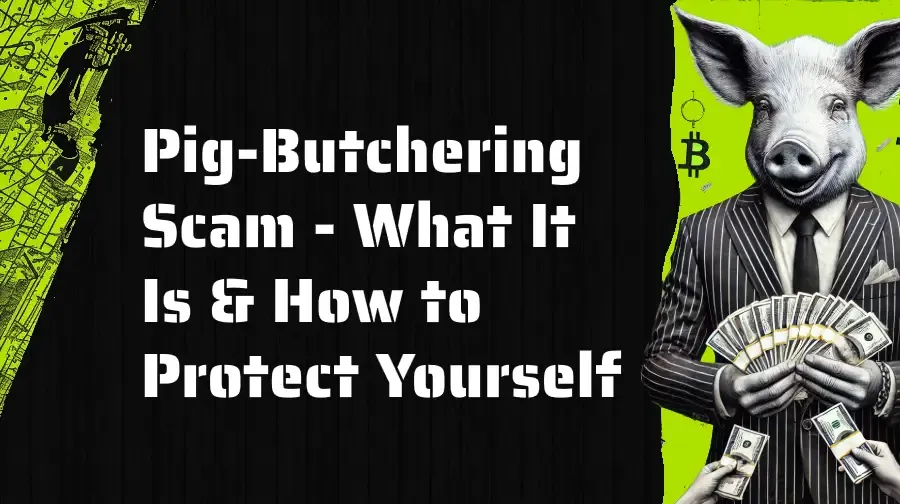Introduction
The term pig-butchering scam might sound peculiar, but the devastation these scams leave in their wake is no joke. This emerging form of fraud has rapidly gained traction worldwide, targeting unsuspecting individuals with promises of lucrative investments - particularly in the world of cryptocurrency. These scams are cleverly crafted, exploiting human emotions like trust and greed to "fatten up" victims before ruthlessly exploiting them.
In recent years, investment fraud losses have skyrocketed, with pig-butchering scams playing a major role. For instance, the FBI reported that cryptocurrency-related fraud increased by 183% in 2022, totaling an eye-watering $2.57 billion in losses1. What makes these scams especially chilling is their combination of psychological manipulation, financial theft, and in some cases, ties to human trafficking rings2.
In this blog post, we’ll break down what pig-butchering scams are, how they operate, and their devastating impact. Most importantly, we’ll share actionable tips to help you identify and avoid falling victim to these increasingly sophisticated schemes. Knowledge is your best defense, so let’s get started.
What Is a Pig-Butchering Scam?
At first glance, the term pig-butchering scam might sound confusing or even comical, but the reality behind it is far from amusing. This scam gets its name from a metaphor: much like how a farmer fattens up a pig before slaughtering it, scammers meticulously "fatten up" their victims - building trust, grooming them emotionally, and often manipulating their financial decisions - before ultimately defrauding them.
These scams usually start with unsolicited contact, often through social media platforms, dating apps, or messaging services. The scammer, pretending to be a friendly acquaintance or a potential romantic interest, begins cultivating a relationship with the victim. This process is carefully orchestrated to establish trust and create a false sense of intimacy.
Once the victim feels comfortable, the scammer introduces a seemingly lucrative investment opportunity, typically in cryptocurrency or another high-risk, high-reward sector. The victim is lured into making small, successful investments initially to build confidence. Over time, the scammer encourages them to invest larger sums, often directing them to fraudulent trading platforms or fake apps. Once the victim's funds are deposited, the scammer vanishes, leaving them with devastating financial losses.
The sophistication of pig-butchering scams lies in their ability to exploit emotional vulnerabilities. Scammers spend weeks, or even months, grooming their victims, making these schemes particularly manipulative and harmful. This calculated approach has led to a dramatic rise in their prevalence, with cases reported globally and losses reaching into the billions.
How Do Pig-Butchering Scams Work?
Pig-butchering scams are elaborate frauds where perpetrators meticulously groom their victims to gain trust and ultimately defraud them. Understanding the typical progression of these scams can help you recognize and avoid them. Here's how they generally unfold:
1. Initial Contact
Scammers often initiate contact through unsolicited messages on social media platforms, dating apps, or messaging services. They may pose as friendly acquaintances or potential romantic interests, sometimes claiming to have contacted you "by mistake" to spark a conversation. Using fake profiles with stolen photos, scammers craft personas designed to appear trustworthy and approachable.
2. Building Trust
Once communication is established, scammers invest time in building a relationship. They engage in regular, friendly, or romantic conversations, sharing personal anecdotes and showing genuine interest in your life. This process, known as "fattening up the pig", is a deliberate and calculated method to gain emotional leverage, making you more susceptible to their schemes. Scammers can spend weeks - or even months - crafting this false sense of security.
3. Introduction of Investment Opportunities
After gaining trust, the scammer introduces the idea of a lucrative investment opportunity, often in cryptocurrency or other high-yield ventures. Victims are lured in with promises of quick profits and minimal risks, often supported by fake success stories or counterfeit "proof" of returns. Many scammers use professional-looking but fraudulent websites or apps designed to mimic legitimate trading platforms, adding a veneer of credibility.
4. Exploitation and Theft
As you begin to invest, initial returns may appear promising, reinforcing the scammer's credibility. Victims, convinced by these apparent successes, often increase their investments. However, once the scammer determines they’ve extracted enough money, they disappear - cutting off communication, freezing accounts on fake platforms, and leaving victims with devastating financial losses. Reports show that some victims lose their entire life savings, with little to no recourse for recovery3.
If you're uncertain whether an offer or interaction is legitimate, consider using our Website Scam Detector or Scam Detector Tool to analyze suspicious URLs and messages. Knowledge is your best defense.
Impact of Pig-Butchering Scams
Pig-butchering scams have emerged as a significant threat, inflicting severe financial and emotional damage on victims worldwide. Let's delve into the scope of this menace:
Financial Losses
In 2022, investment fraud led to the highest losses reported to the FBI's Internet Crime Complaint Center, totaling $3.31 billion. Notably, fraud involving cryptocurrency, including pig-butchering schemes, constituted a substantial portion of these scams, with losses increasing by 183% from 2021, reaching $2.57 billion4.
Projections indicate that global losses from pig-butchering scams could escalate to $142.83 billion by 2025, underscoring the urgent need for heightened awareness and preventive measures5.
Global Reach
These scams have a worldwide footprint, with victims spanning across continents. A recent study estimates that pig-butchering scams have already resulted in over $75 billion in stolen funds globally, highlighting the extensive reach and sophistication of these fraudulent operations6.
Human Trafficking Concerns
Alarmingly, many individuals orchestrating these scams are themselves victims of human trafficking. Criminal syndicates, particularly in Southeast Asia, coerce trafficked individuals into conducting these fraudulent activities under threat of violence or other forms of coercion. This exploitation adds a tragic layer to the crisis, intertwining financial fraud with severe human rights abuses7.
Real-Life Examples
Understanding the human impact of pig-butchering scams is crucial. Here are several poignant cases that highlight the devastating consequences of these fraudulent schemes:
The 75-Year-Old Retiree
A 75-year-old man from the American Midwest fell victim to a sophisticated online scam, losing his entire retirement savings of over $715,000. The deception began with a LinkedIn message from a woman posing as a wealthy young Chinese immigrant. Over several months, she built a romantic rapport with the victim, eventually convincing him to invest in a bogus trading platform. Despite warnings from his bank, the man trusted the scammer's reassurances and continued transferring funds until his savings were depleted. Read the whole story here.
The Bank CEO's Downfall
Shan Hanes, the former CEO of Heartland Tri-State Bank in Kansas, embezzled $47 million from his institution to invest in a cryptocurrency scheme, believing he was unlocking substantial returns. Unbeknownst to him, he had fallen prey to a pig-butchering scam. His actions led to the bank's collapse and his subsequent sentencing to 24 years in prison. This case underscores that even seasoned financial professionals can be ensnared by these deceptive schemes.
The 80-Year-Old Business Owner
Alice Lin, an 80-year-old small business owner from California, lost her entire life savings of $720,000 to an online scam after being befriended by a stranger on WeChat. Over several weeks, she was convinced to invest in a fraudulent crypto scheme. Realizing the scam when the fraudster pushed her to borrow more money, Lin reported the incident to federal authorities. Traumatized, she struggled with suicidal thoughts and is now suing her bank for missing red flags of elder fraud. Here's the full story.
The Kidnapped Scam Worker
A woman from the San Francisco Bay Area was kidnapped and forced to work as a cryptocurrency scammer abroad. She was lured by a fake job offer, only to find herself trapped and coerced into participating in pig-butchering scams under threat of violence. Her harrowing experience highlights the human trafficking aspect of these operations, where perpetrators are often victims themselves.
These real-life examples serve as stark reminders of the pervasive and damaging nature of pig-butchering scams. They highlight the importance of vigilance and skepticism when approached with unsolicited investment opportunities, regardless of one's age or professional background.
How to Protect Yourself from Pig-Butchering Scams
Protecting yourself from pig-butchering scams requires a combination of vigilance, skepticism, and informed decision-making. Here are some practical tips to safeguard yourself:
Be Skeptical of Unsolicited Contacts
If someone reaches out unexpectedly - whether through social media, dating apps, or messaging platforms - approach with caution. Scammers often use these channels to establish initial contact. Trust your instincts: if something feels off, it probably is.
Verify Investment Opportunities
Before investing in any opportunity, especially cryptocurrency, conduct thorough research. Look up the platform's credentials, read reviews, and check for any red flags such as unrealistic profit guarantees or lack of regulatory oversight. Remember, if an investment sounds too good to be true, it likely is.
Protect Personal Information
Avoid sharing sensitive personal or financial information online, even with individuals who seem trustworthy. Scammers use small bits of information to build a profile of their victims and exploit vulnerabilities.
Seek Professional Advice
Before making significant investments, consult with qualified financial advisors or experts. They can help you evaluate opportunities and identify potential scams. Having a second opinion can save you from costly mistakes.
What to Do If You Suspect a Scam
If you suspect that you’re being targeted by a pig-butchering scam, acting quickly and decisively is crucial. Follow these steps to minimize potential damage:
Cease Communication
The moment you suspect foul play, stop all communication with the scammer. Don’t provide any additional information, and avoid responding to their attempts to re-engage. Scammers thrive on prolonged interaction to exploit their victims further.
Report to Authorities
File a report with local law enforcement or relevant agencies, such as the FBI Internet Crime Complaint Center (IC3) or your country’s equivalent cybercrime division. Sharing details about the scam helps authorities track patterns and potentially disrupt scam networks.
Consult Cybersecurity Experts
If you’ve already shared personal or financial information, consult a cybersecurity professional to assess potential risks. They can help secure your accounts, monitor for identity theft, and advise on recovery steps.
Notify Financial Institutions
If you’ve transferred money or provided banking details, contact your financial institution immediately. They may be able to freeze transactions, recover funds, or take other protective measures.
Conclusion
Pig-butchering scams are a stark reminder of the dangers lurking in our increasingly digital world. From emotional manipulation to devastating financial losses, these schemes leave lasting scars on their victims. By understanding how these scams operate, learning from real-life examples, and following practical prevention tips, you can protect yourself and others from becoming the next victim.
Awareness is a powerful tool. Share this guide with your friends, family, and colleagues to spread the word about pig-butchering scams. The more people who know about these tactics, the harder it becomes for scammers to succeed. When in doubt, tools like our Website Scam Detector and Scam Detector Tool are here to help you evaluate suspicious contacts and investment opportunities. Together, we can outsmart the scammers.
Sources:
- FBI Internet Crime Report: FinCEN Alert: Pig Butchering Scams
- TIME Magazine: Human Trafficking and Pig-Butchering Scams
- TIME Magazine: Emotional Impact of Scams
- FBI Internet Crime Report: FinCEN Alert: Pig Butchering Scams
- VPNRanks: Pig Butchering Scams Statistics
- TIME Magazine: Pig Butchering Scams Victim Loss Study
- TIME Magazine: The Enduring Nightmare of Trafficked Scammers

